- Home
- Pamela Clare
Hard Evidence
Hard Evidence Read online
Hard Evidence
by
Pamela Clare
I-Team Series – Book 2
This book is dedicated to Sgt. Gary Arai and Lt. Tim McGraw, who saved my life on the night of August 24, 1987. You are the real heroes.
ACKNOWLEDGMENTS
With deepest thanks to Kenlyn Kolleen and Free A Child for inspiring this story and for fighting the battle against child sex trafficking on the streets of Denver and in the villages of Nepal. To help, go to www.freeachild.org.
Special thanks to Sgt. Gary Arai for his insight on police operations and gear and to Scott Weiser for his gun expertise.
Special thanks also to Vince Darcangelo for letting me borrow his last name—and certain other attributes—for my story.
Muchisimas gracias to Anna de la Pena for the Spanish translations.
Caffeinated thanks to Aimee Culbertson for making my latte dreams come true. You kept me going till the wee hours.
With gratitude to Cindy Hwang and Natasha Kern for your support and guidance.
Personal thanks to: Michelle White, Timalyn O'Neill, Karen Marie Moning, Kelly LaMar, Sara Megibow, Dede Laugesen, Vickie McCloud, Kally Jo Surbeck, Alice Brilmeyer, Alice Duncan, Mimi Riser, Bonnie Vanak, No-rah Wilson, and Jan Zimlich. I don't know what I'd do without you!
And with love to my family and to my sons, Alec and Benjamin, whose love and support means more to me than they can possibly know.
Chapter 1
Coffee was Tessa Novak's heroin. And right now she craved it with the desperation of a street junkie. What she wanted—what she needed—was a triple-shot grande skinny vanilla latte made with organic shade-grown Mexican beans. What she was going to get was toxic gas-station swill.
Serves you right for losing track of time, girl.
The last of the decent coffee shops had closed fifteen minutes ago while she'd been sitting stupidly at her desk reading through files.
She nosed her car into the brightly lit gas-station parking lot, braking for a couple of skateboarders who seemed oblivious to the dangers of both traffic and gravity, and parked next to an SUV that was blasting Eminem. Then she grabbed her handbag out of her briefcase and stepped out of her car into the reek of exhaust and gasoline fumes.
Even though it was October, the air was still warm—one of those strange Colorado Indian summers that dragged on forever. Although most of her friends at the paper were happy with the warm, sunny weather, Tessa wished it would hurry up and snow. She loved the cold, loved the fresh smell of a new snowfall, loved the way the landscape transformed overnight from a dirty, gray city to a world of pure, sparkling white.
She'd grown up in the South and hadn't made her first snowman until she'd moved to Denver three years ago at the age of twenty-five. Though that was the least of what had been wrong with her childhood, it had somehow become symbolic of everything else. The year's first snowstorm had become a kind of ritual for Tessa, an annual celebration of her escape.
This year the snow was late.
She hurried across the parking lot and through the glass doors. The smell of the city was replaced by the odors of stale hot dogs, industrial cleaner—and coffee. Cutting through the short line of people at the register, she followed her nose to the back counter and found a glass pot half full of what looked like dirty motor oil.
She stopped, stared at it, her mind at war with her craving. She looked over at the attendant, an older man with short gray hair and a bulbous nose. "How old is the coffee?"
"How should I know?" He scanned a woman's cigarettes, didn't even look up.
"Oh, I don't know." Tessa lifted the pot, sniffed its contents, kept her voice sweet. "Maybe you work here or something."
"It was there when I came on two hours ago."
Which meant it might have been sitting on the wanner since Jesus was a child.
But a fix was a fix.
Consigned to her fate, she tipped the black liquid into a large foam cup, then grabbed four vanilla-flavored creamer packets and dumped them in one at a time, wishing to God she'd looked at her watch twenty minutes sooner.
She'd been working late again, more because she had nothing better to do than because she truly needed to. Her contribution to tomorrow's newspaper—a short follow-up piece about the police officer from the 321st who'd been killed on a domestic-violence call—had been filed hours ago. She'd taken advantage of her complete lack of a love life to spend her Tuesday night reading through more of the documents she'd requested from the police department's contracts office. She was on a fishing expedition, she knew, but that was how many of the best investigative stories began—with a reporter picking up rocks just to see what lay hidden beneath.
And what had she found so far? Not so much as one wriggling worm.
No lucrative contracts given to relatives. No padding of expenses. No money transferred to companies that didn't exist.
Chief Irving ran a tight ship—not perfect, but tight.
Tessa told herself she should be pleased. After all, she wasn't out to cut the Denver Police Department off at the knees. If the cops weren't crooks, that was a good thing. Unfortunately, "Nothing Bad Happening" didn't make for a splashy sixty-point headline.
Tessa had moved to Colorado from Savannah to take a seat on the Denver Independent's elite Investigative Team—the I-Team—as the cop reporter. Relatively new to journalism, she'd been astonished to land the job. She'd worked hard to prove herself to Tom Trent, the paper's demanding editor in chief—okay, so the guy could be a complete jerk—by putting in sweatshop hours, sacrificing sleep, and foregoing any chance at romance to justify her place on the team. But it had been a while now since she'd unearthed anything worth its weight in newsprint. What she needed was a big story.
No, what she needed was caffeine.
She lifted the cup to her lips, sipped, grimaced. It tasted far worse than she'd imagined, but it was potent. She took a bigger sip and started toward the counter, grateful to see the line was gone.
She'd just pulled a couple of bucks out of her purse when the door opened with a jingle and a pretty, young Latina ran in, panic in her eyes, tears streaming down her face. Barefoot, wearing cutoffs and a skimpy tank top, she looked strangely out of place for this time of year.
"jPorfavor, senor, ayüdeme! Ayudeme!" she sobbed. "/Me van a matar! "
Please, sir! Help me! Help me! They're going to kill me!
Startled, Tessa stopped in her tracks.
The girl ran to the counter. "; Ayudeme! /Llameapolicia!"
Help me! Call the police!
But it was clear the attendant hadn't understood a word she'd said. He stared at the girl in openmouthed confusion, frozen like a statue.
Tessa's mouth reconnected with her brain, and she tore through her purse for her cell phone. "Quien? Quien te va a matar?"
Who's going to kill you ?
The girl looked at Tessa through pleading brown eyes, her entire body trembling, then glanced back over her shoulder. "¡Madre de—!"
Mother of—!
It was over in an instant that seemed to stretch on forever.
A shiny black car, one tinted window sliding down. The girl's terrified scream. An explosion of bullets and shattered glass. A squeal of tires. The stench of burning rubber.
Tessa found herself on the floor on her belly, the rapid hammer of her pulse overwhelming the silence. Before her, the girl lay lifeless in a pool of blood and coffee, her eyes open and empty, tears still sliding down her cheeks.
"Did you see the weapon?"
Tessa had already gone over her statement twice. The cop, a young detective named Petersen whom she'd seen once or twice before, was just going through his notes, trying to be thorough. They'd brought her to the other side of the store while the
scene was photographed and the girl's body was tagged and bagged. EMTs loaded the body bag into an ambulance for transport to the medical examiner. Another ambulance had already taken the attendant to the hospital with a suspected heart attack.
Outside, lights from a dozen squad cars flashed red and blue. Uniformed officers kept the curious at bay. Others questioned bystanders or combed the store and parking lot for evidence. Over the years Tessa had been to hundreds of crime scenes, but this was the first time she'd seen it from a victim's perspective. Somehow it didn't feel real.
"Y-yes, sir, just a glimpse." Why was it so hard to think?
She pulled the blanket the victim's advocate had given her more tightly around her shoulders, tried to stop her shaking, forced herself to concentrate. "The shots came so fast."
"But you couldn't see the shooter. Is that correct?"
"I only saw his arm. He was wearing black gloves and a black leather jacket."
"You didn't get the make of the car or the plates."
"N-no, sir. I saw a shiny, black car, and then…" She felt herself moving toward tears, swallowed hard. "And then they started shooting."
A shiny, black car. Silver hubcaps turning. Spinning.
"The hubcaps." She spoke without realizing it. "They had a separate piece in the center, jagged like a buzz saw. It was spinning on its own—or so it seemed."
"So the driver's got himself a fancy set of rims. That might help us out. Did you see any emblem on them—any kind of symbol?"
She tried to remember. "No, sir. I'm sorry."
"I have to say I love your accent. Where are you from?"
Confused by the trivial question, it took Tessa a moment to answer. "Georgia."
It was then she saw him.
He stood outside the police tape just on the edge of the parking lot, half in light and half in shadow. His hair was dark and pulled back in a shoulder-length ponytail, his jaw darkened by a heavy growth of stubble. At least six feet tall, he wore a pair of worn Levi's—and a black leather jacket. And he was watching her.
Tessa met his gaze and felt her heartbeat trip. "There's a man—!"
But he was already gone.
'There was a man standing there—a man in a black leather jacket."
Detective Petersen looked over his shoulder in the direction she was pointing and frowned. "Who can I call to come pick you up, Ms. Novak?"
"Aren't you going to question him?" Tessa's gaze roamed the darkness.
"I'll have one of the officers look around. Right now, I need to get you safely home. Do you have family I can call?"
"No, no family." Even if she'd been on her deathbed and her mother had lived nearby, Tessa wouldn't have called her. She hadn't spoken with her mother for ten years. "I'll just drive myself. My car's over there."
Detective Petersen looked at her through solemn brown eyes. "Sorry, but I can't let you drive. If there's someone I can call—a friend or coworker?"
And she realized he was right. She shouldn't be behind the wheel. She could barely keep her knees from knocking. And suddenly she wanted to talk to Kara. "I'll do it."
A former member of the I-Team, Kara McMillan was perhaps the best journalist Tessa knew and one of her closest friends. Kara had broken one of the biggest stories ever to hit Denver— and had come close to being murdered in the process. If anyone would understand how Tessa felt right now, it was Kara.
Tessa fumbled for her cell phone, scrolled down until she came to Kara's name, and pressed auto-dial. It wasn't Kara who answered, but Reece, Kara's senator husband.
"Kara's putting Connor and Caitlyn to bed," he said. "Can I have her call you back?"
Somehow the warm sound of his voice made it harder for Tessa to keep it together. She felt tears prick her eyes, and her voice quavered. "I-I'm sorry to bother you, but I need a favor. 1-1 was getting coffee, and this car drove up, and… They shot her, Reece. She's dead."
"Who's dead? Tessa, are you all right? Where are you? Are the police there?"
"I-I'm fine—just shaken up, I guess." She forced her mind to focus. "I'm at the gas station at Colfax and York. And, yes, the police are here."
"Find an armed officer, and stay close to him. I'll be right there."
Julian Darcangelo watched the pretty blonde climb into the Jeep of the man who'd come to pick her up—probably her husband or live-in lover. Her young face reflected both shock and horror, the reactions of the healthy mind to the fucked-up reality of murder.
How long had it been since Julian had felt those emotions?
He didn't even bother trying to remember.
He watched the Jeep turn and head back down Colfax, memorized the license plate number out of habit, careful to keep to the shadows. He hadn't meant for her to see him, had wondered at the reaction on her face. She'd seemed to recognize him, but that was impossible. He'd only been in Denver for a few months and had spent most of his time in places no woman would choose to go. Besides, he knew without a doubt that he'd never seen her before. With long, curly blond hair and big eyes, she wasn't the kind of woman a man could easily forget.
The killer wouldn't forget her either and might well come back to finish the job. Burien hated sloppy work. He wouldn't want a witness, particularly not one who might have spoken with the victim. It wouldn't surprise Julian if the shooter showed up dead in an alley in a week or so, riddled with bullets from his own weapon. Burien had a nasty temper, even for an old Russian mafioso.
Julian had been pursuing Burien for what seemed like a lifetime. He'd started tracking Burien and his partners—Rafael Clemente Garcia and Jarrett Pembroke—in the late nineties, eventually infiltrating Garcia's operation. He'd sent Garcia and Pembroke to prison and had called it justice when they'd died behind bars, Garcia by suicide, Pembroke beaten to death by a fellow inmate who hadn't appreciated his choice of career. But Burien had slipped away.
Julian had taken full responsibility. He'd let the job get to him, and his lapse in judgment had cost him his relationship with Margaux, left two good agents dead, and given Burien the chance he needed to slip away. Julian had resigned the next day, but he'd never stopped looking for Burien.
When Ed Dyson had called from HQ in D.C. and asked him to come back to help flush Burien out of hiding, he'd agreed, even though it meant having to work again with Margaux, who was handling computer ops. Ridding the world of Burien would be more than worth whatever personal price he might have to pay. For four months now, he'd served as FBI liaison to the Denver Police Department's vice unit. It wasn't the deep-cover work he was used to, but the position allowed him to work independently, to utilize police resources at will, and to spend plenty of time on the streets, sniffing out Burien's trail.
And Julian was close, so close. He could feel it.
He'd had the basement apartment down the street under surveillance for a week, had known it was one of Burien's cribs. He'd chosen not to move quite yet, sure he'd spook Burien and drive him further underground. He'd never imagined one of the girls would run. They never ran. They were too afraid, too drugged, too broken to run.
Goddamn it!
The plainclothes officer who'd been watching the place tonight claimed he hadn't known the girl had bolted until Burien's men jumped in the car to follow her. He'd called it in, unsure how to intervene, uncertain whether his orders permitted him to intervene. Julian had been on the other side of town and had heard the call go out over his police radio. By the time he'd arrived, the girl was dead.
Now Burien was responsible for another murder, and the weight of it settled on Julian's shoulders. He'd gotten used to that weight, to the burden of knowing he'd enabled a killer to keep killing. Both of them would pay—Julian by dragging that burden with him for the rest of his life and Burien when he landed behind bars or someone put a bullet through his skull.
Julian watched the taillights of the Jeep disappear, hoped the man driving it had the smarts to protect the woman beside him, then glanced at his watch. First, he'd lead a team thro
ugh the apartment to collect whatever evidence had been left behind. Then he'd head to the station and make certain the witnesses' names weren't in the police report where Burien could too easily find them. He turned and walked down the dark street, an image of the pretty blonde's stricken face in his mind.
* * *
"If only I hadn't frozen!" Tessa dabbed the tears from her eyes. She hated crying in front of people, even friends. "If only I'd dialed nine-one-one right away or pulled her into the aisle!"
She'd already had a shower to wash the girl's blood away and was wearing one of Kara's nightgowns and bathrobes while her own clothes ran through the washer and dryer.
"It's not your fault." Kara sat beside her in sweatpants and a denim shirt that obviously belonged to Reece, her long dark hair pulled back in a sleek braid. She looked remarkably unruffled for a mother of two. "There's nothing you could have done in those few seconds that would have made any difference."
"Drink." Reece thrust a tumbler into her hands. "Kara's right. There's no way the police could have made it in time, and a display of potato chips isn't going to stop automatic weapons fire. It's a damned miracle you weren't killed, too."
Tessa tried not to think about that. She knew it had been close. She'd been standing perhaps three feet from the girl when the shooting had started. "I guess it's lucky for me the guy could aim."
Lucky for me. Not so lucky for her.
She took a deep swallow of whatever Reece had handed her, unaware until she felt the burn that it was scotch. She coughed, then took another drink.
"Oh, Tess, I am so sorry!" Kara rested a comforting arm around her shoulders. "And quit trying to act tough. You've just survived a nightmare. No one is supposed to be okay after witnessing a murder."
Her sympathy cut through Tessa and unleashed new tears. "Did you blubber like this after that bastard at the cement plant tried to kill you?"
"I had nightmares for months and cried a lot. Ask him."
Reece nodded, his face grave. "If you weren't shaken up by this, you'd be weird."

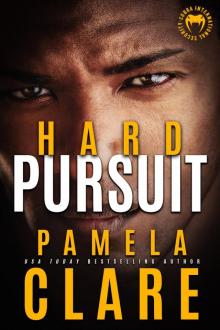 Hard Pursuit
Hard Pursuit Hard Asset: A Cobra Elite Novel
Hard Asset: A Cobra Elite Novel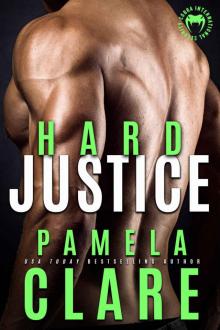 Hard Justice (Cobra Elite Book 3)
Hard Justice (Cobra Elite Book 3)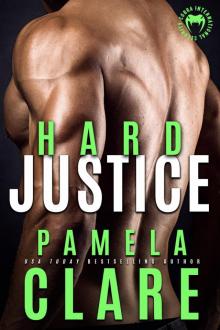 Hard Justice
Hard Justice Hard Edge (Cobra Elite Book 4)
Hard Edge (Cobra Elite Book 4)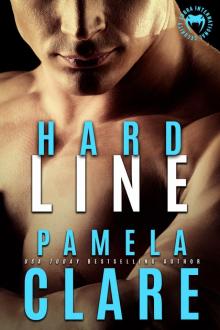 Hard Line
Hard Line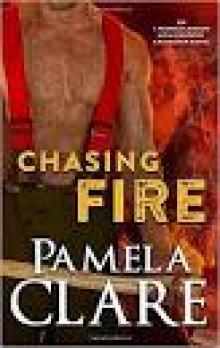 Chasing Fire: An I-Team/Colorado High Country Crossover Novel
Chasing Fire: An I-Team/Colorado High Country Crossover Novel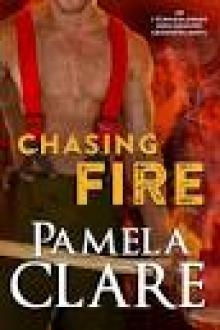 Chasing Fire
Chasing Fire Hard Edge
Hard Edge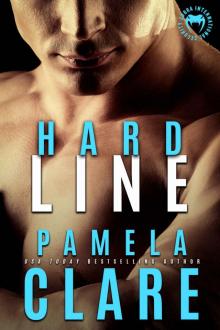 Hard Line (Cobra Elite Book 5)
Hard Line (Cobra Elite Book 5)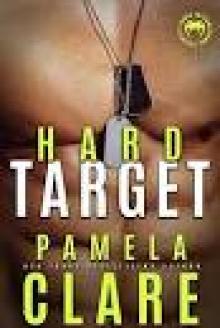 Hard Target (Cobra Elite Book 1)
Hard Target (Cobra Elite Book 1) Hard Target
Hard Target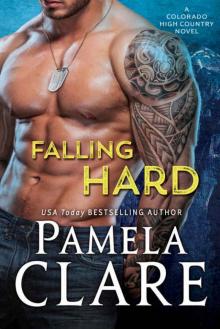 Falling Hard (Colorado High Country #3)
Falling Hard (Colorado High Country #3)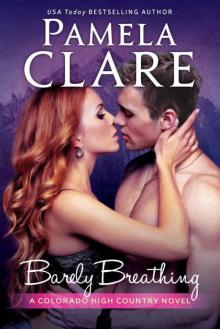 Barely Breathing (Colorado High Country #1)
Barely Breathing (Colorado High Country #1) Close to Heaven
Close to Heaven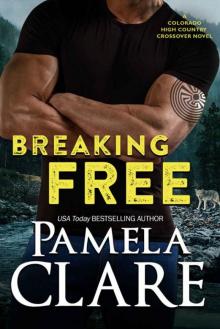 Breaking Free: A Colorado High Country Crossover Novel
Breaking Free: A Colorado High Country Crossover Novel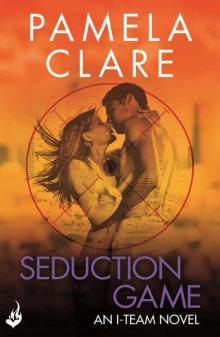 Seduction Game
Seduction Game Hard Asset
Hard Asset UNTAMED
UNTAMED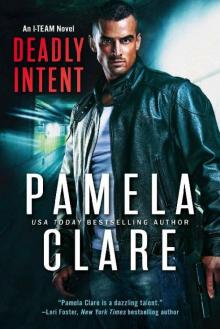 Deadly Intent (I-Team Book 8)
Deadly Intent (I-Team Book 8) Kenleigh-Blakewell Family Saga Boxed Set (Books 1 & 2)
Kenleigh-Blakewell Family Saga Boxed Set (Books 1 & 2)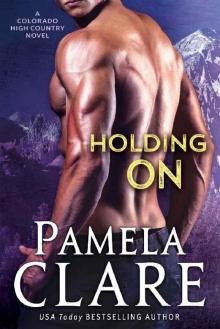 Holding On: A Colorado High Country Novel
Holding On: A Colorado High Country Novel Extreme Exposure
Extreme Exposure MacKinnon’s Rangers 03.5 - Upon A Winter's Night
MacKinnon’s Rangers 03.5 - Upon A Winter's Night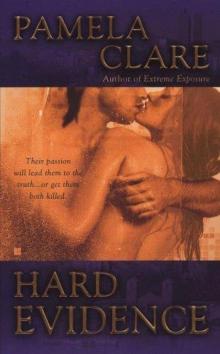 Hard Evidence
Hard Evidence Ride the Fire (Blakewell/Kenleigh Family Trilogy, #3)
Ride the Fire (Blakewell/Kenleigh Family Trilogy, #3) Surrender
Surrender Close to Heaven: A Colorado High Country Christmas
Close to Heaven: A Colorado High Country Christmas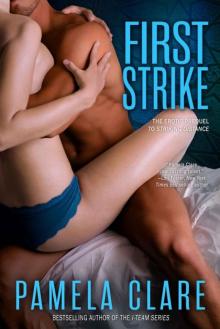 First Strike
First Strike Heaven Can't Wait
Heaven Can't Wait Breaking Point
Breaking Point Naked Edge
Naked Edge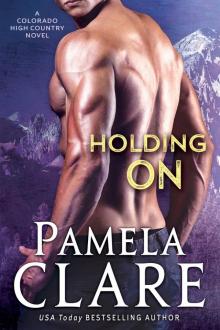 Holding On
Holding On Defiant
Defiant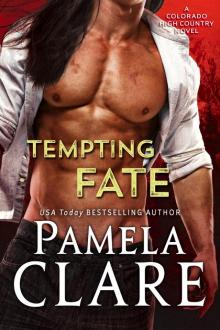 Tempting Fate: A Colorado High Country Novel
Tempting Fate: A Colorado High Country Novel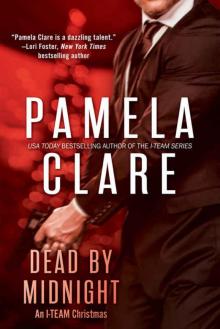 Dead by Midnight
Dead by Midnight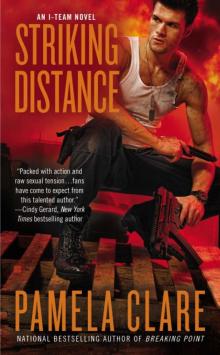 Striking Distance
Striking Distance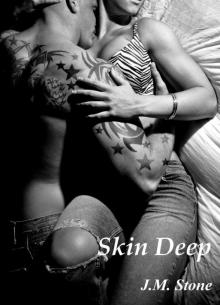 Skin Deep
Skin Deep Danger and Desire: Ten Full-Length Steamy Romantic Suspense Novels
Danger and Desire: Ten Full-Length Steamy Romantic Suspense Novels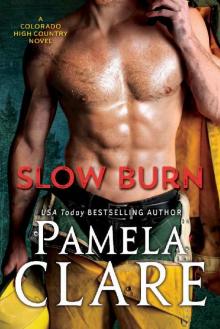 Slow Burn: A Colorado High Country Novel
Slow Burn: A Colorado High Country Novel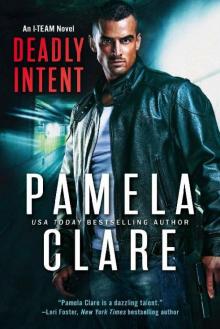 Deadly Intent
Deadly Intent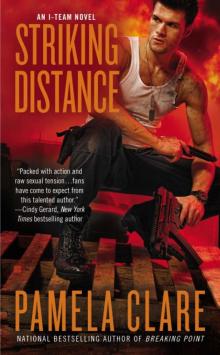 Striking Distance ti-6
Striking Distance ti-6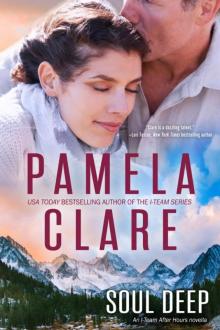 Soul Deep
Soul Deep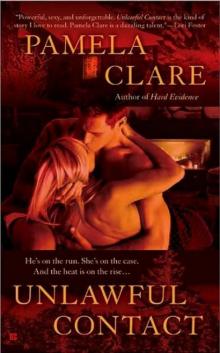 Unlawful Contact
Unlawful Contact